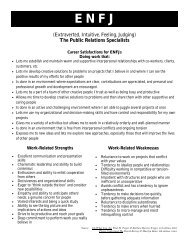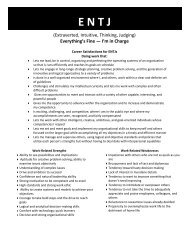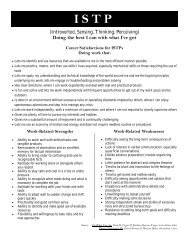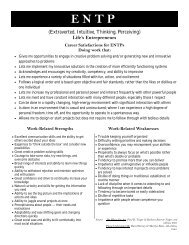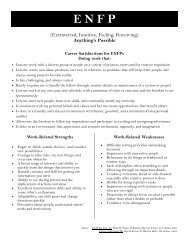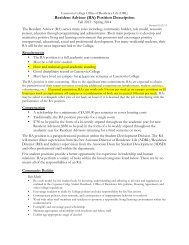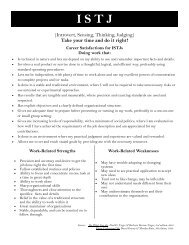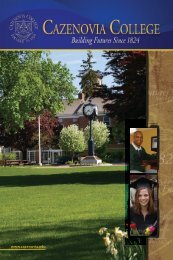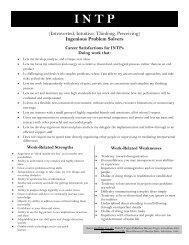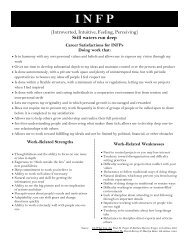of
2013-14 Academic Catalog - Cazenovia College
2013-14 Academic Catalog - Cazenovia College
- No tags were found...
Create successful ePaper yourself
Turn your PDF publications into a flip-book with our unique Google optimized e-Paper software.
HG 208/308 History <strong>of</strong> Mexico<br />
3 credits (AS)<br />
This course introduces students to the people and history<br />
<strong>of</strong> Mexico from its ancient past through the present day,<br />
focused on developing students’ understanding <strong>of</strong> our<br />
distant neighborǁ‖ and enhancing students’ appreciation<br />
<strong>of</strong> its diverse culture. This course further seeks to increase<br />
students’ awareness <strong>of</strong> the relationship between past<br />
events and present realities through readings, discussions,<br />
and assignments intended to highlight such relationships.<br />
(Offered on a rotating basis)<br />
HG 211/311 History <strong>of</strong> the African Diaspora<br />
3 credits (AS)<br />
In a span <strong>of</strong> almost four centuries, millions <strong>of</strong> Africans<br />
were transported to North America, South America, and<br />
the Caribbean Islands as slaves. Forcibly removed from<br />
their homelands and separated from their kin and<br />
societies, they were enslaved in a new world where all<br />
familiar customs were suppressed. This course examines<br />
how Africans, despite these brutal conditions, managed to<br />
reform their identities in a new world. Through a<br />
comparative examination <strong>of</strong> African experiences in<br />
different new world societies, students will gain an<br />
appreciation <strong>of</strong> the ways in which Africans created social<br />
identities and cultures for themselves in these trying<br />
conditions. (Offered on a rotating basis) Prerequisites:<br />
EN 101 Academic Writing I for 200 level and EN 201<br />
Academic Writing II for 300 level or permission <strong>of</strong> the<br />
instructor.<br />
HG 212/312 History <strong>of</strong> Africa<br />
3 credits (AS)<br />
This course introduces students to the general themes <strong>of</strong><br />
African history from the ancient civilizations <strong>of</strong> Egypt<br />
and Mali to the current day. Particular attention is paid to<br />
the basic patterns <strong>of</strong> indigenous African civilizations and<br />
the impact <strong>of</strong> outside forces upon those patterns. This<br />
investigation helps students understand how African<br />
responses to the slave trade, European imperialism, and<br />
the spread <strong>of</strong> world religions such as Christianity and<br />
Islam have created the world <strong>of</strong> modern Africa. Readings<br />
and discussion <strong>of</strong> selected case studies provide additional<br />
depth to students’ investigation <strong>of</strong> these topics. (Offered<br />
on a rotating basis) Prerequisites: EN 101 Academic<br />
Writing I for 200 level and EN 201 Academic Writing II<br />
for 300 level, or permission <strong>of</strong> the instructor<br />
HG 223 Women in American History<br />
3 credits (AS)<br />
This course examines the economic, social, political and<br />
cultural experiences <strong>of</strong> women in American history.<br />
Students study historical themes central to explaining our<br />
country’s history from the perspective <strong>of</strong> women.<br />
(Offered on a rotating basis)<br />
HG 241 Comparative Government and Politics<br />
3 credits (AS)<br />
Working on the assumption that what happens in other<br />
countries is important to us all, this course examines the<br />
governments <strong>of</strong> the industrialized democracies, the<br />
European Community, the former Soviet states, and Third<br />
World nations, in an attempt not only to find similarities<br />
and differences, but also to apply lessons from their<br />
development to the future growth <strong>of</strong> the United States.<br />
Prerequisite: HG 141 Government and Politics <strong>of</strong> the U.S.<br />
HG 261 Comparative Political Ideologies<br />
3 credits (AS)<br />
This course examines major political philosophies <strong>of</strong> the<br />
20th Century and their impact on the systems <strong>of</strong><br />
government in different world areas. In addition to<br />
studying the basic principles <strong>of</strong> liberal democracy,<br />
communism and fascism, the course focuses on the<br />
successes and failures <strong>of</strong> these ideologies and the political<br />
challenges facing both developed and developing nations.<br />
HG 301 Models <strong>of</strong> Society<br />
3 credits (AS)<br />
In this interdisciplinary course, students analyze and apply<br />
theoretical models drawn from the social sciences<br />
including, but not limited to, geography, economics,<br />
history, and political science. Topics discussed include the<br />
impact <strong>of</strong> geography on economic and environmental<br />
issues, international economic systems and theories,<br />
individual and collective economic and political decisionmaking,<br />
political systems and theories, and manifestations<br />
<strong>of</strong> authoritative and subaltern status in national and<br />
international contexts. (Offered alternate years)<br />
HG 310 Modern Latin America<br />
3 credits (AS)<br />
This course traces the political, social, cultural and<br />
economic evolution <strong>of</strong> the nations <strong>of</strong> Latin America from<br />
the Independence period through the present day.<br />
Particular attention is paid to the diversity <strong>of</strong> experience<br />
and culture generated by the interaction <strong>of</strong> the region’s<br />
indigenous, African, and European peoples. (Offered on a<br />
rotating basis)<br />
HG 320 New York State History<br />
3 credits (AS)<br />
This course will facilitate an understanding <strong>of</strong> the ways<br />
that New York State played a vital role in the economic,<br />
political, and social development <strong>of</strong> the United States <strong>of</strong><br />
America at national and local levels. The village <strong>of</strong><br />
Cazenovia is located near the sites <strong>of</strong> tragic battles,<br />
religious evangelism, abolition activities, the quest for<br />
women’s rights, and many others. We will discuss several<br />
<strong>of</strong> those places. Other topics that will be covered include<br />
the diversity <strong>of</strong> New York’s citizens, immigration,<br />
activism, culture, race, and industrial and technological<br />
developments from the earliest Native American<br />
inhabitation to the present day.<br />
HG 325 United States in the 1960’s<br />
3 credits (AS)<br />
This course undertakes an intensive study <strong>of</strong> what is<br />
arguably the most domestically divisive—and intellectually<br />
challenging—decade in our nation’s history. Using<br />
Academic Catalog | Cazenovia College | www.cazenovia.edu 166



